Alfie (1966)
“You’ve got to live for yourself in this world, not for others.”
|
Synopsis: |
|
Genres, Themes, Actors, and Directors:
Review: … and he possesses absolute confidence in his words. He explains to us, for instance, why he sees no problem in having a secret affair with a married woman, given that, “We’re having fun. Why hurt him? You like to see everybody happy. I don’t believe in making anybody unhappy or in making an enemy. You could be crossing the Sahara desert, and he’d be just the bloke you’d meet.” Indeed, Alfie knows all the tricks of enjoying life without getting into too much trouble — which includes simply dumping his latest fling-on-the-side (Martin) without telling her he’s about to do so. Meanwhile, back on the home front he lives with a submissive woman (Foster) whose primary care in life is ensuring her man is happy: “Did you enjoy yourself? That’s the main thing.” When Foster gets pregnant and decides to keep the baby, we can’t help cheering for her tentative courage, while also making note of Alfie’s dismissiveness — until a boy arrives and he decides he likes at least the fun portions of parenthood. A particularly challenging entanglement occurs when Alfie seduces the lonely wife (Merchant) of his sick friend (Bass), and she gets into a type of trouble that can’t simply be ignored away; her predicament leads to a chilling sequence (featuring Denholm Elliott in a key role) that was kept out of the 2004 remake with Jude Law. Another interlude shows Alfie slyly picking up a beautiful but sad young woman (Asher) who gets through her grief at losing her previous lover through staying busy with cooking and cleaning; she puts up with everything Alfie throws at her until he finally reads her journals — “You ain’t entitled to your secret thoughts, not living with me!” — and she realizes she’s had enough. So it goes with each of the women in Alfie’s life. He does finally meet his match in Winters’ brash Ruby, who enjoys commitment-free sex as much as him — but he comes to realize that his position with her isn’t as secure as he realized. If you don’t mind spending two hours with a narcissistic womanizer like Alfie, you’ll surely enjoy this nicely photographed flick (directed by Lewis Gilbert) — but I don’t believe it’s must-see for all film fanatics. Note: That painting on the wall to the left in Winters’ apartment — “Green Girl” by Vladimir Tretchikoff — turns out to be one of the most famous mass-produced prints in art history; it’s also seen in Hitchcock’s Frenzy (1972). Notable Performances, Qualities, and Moments:
Must See? Links: |
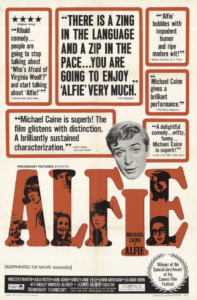
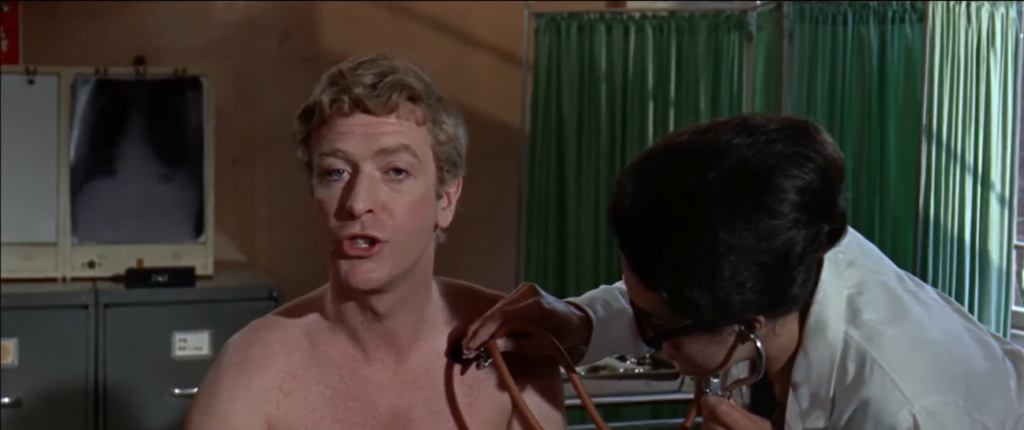
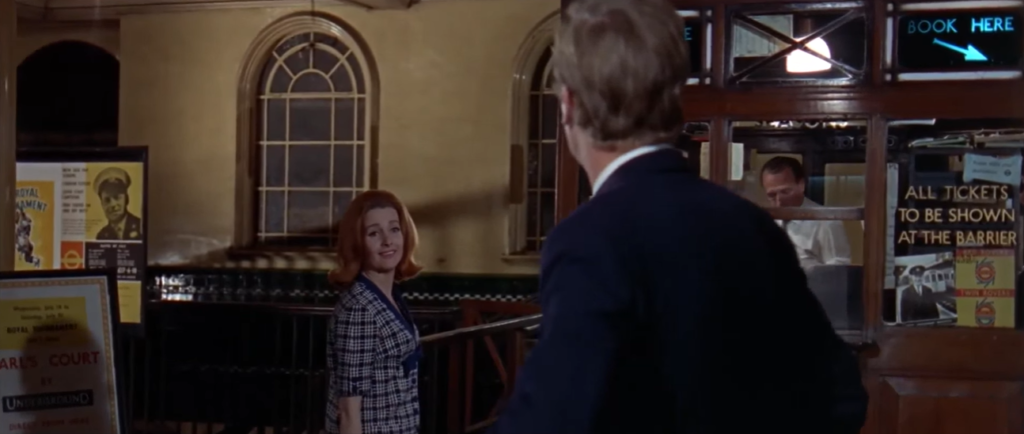
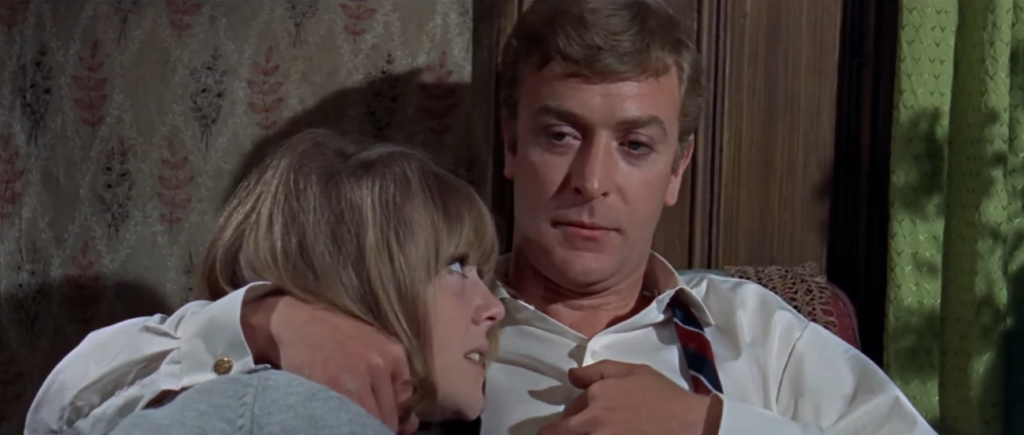

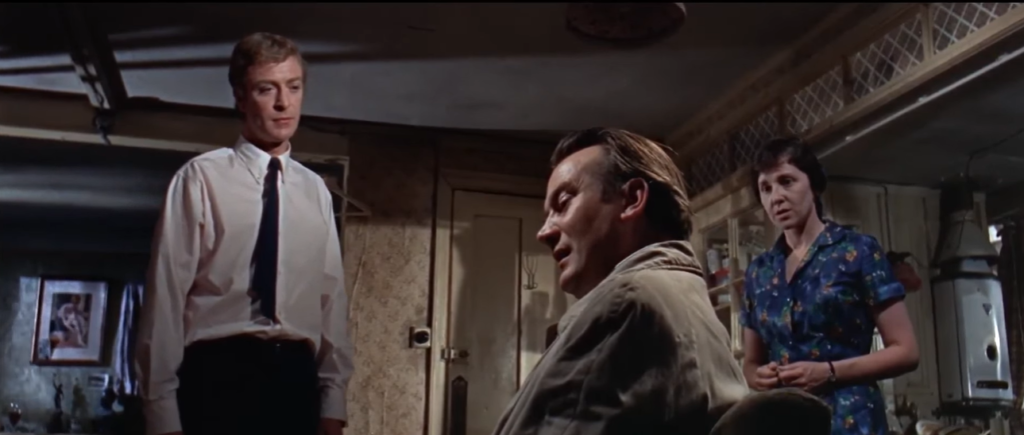
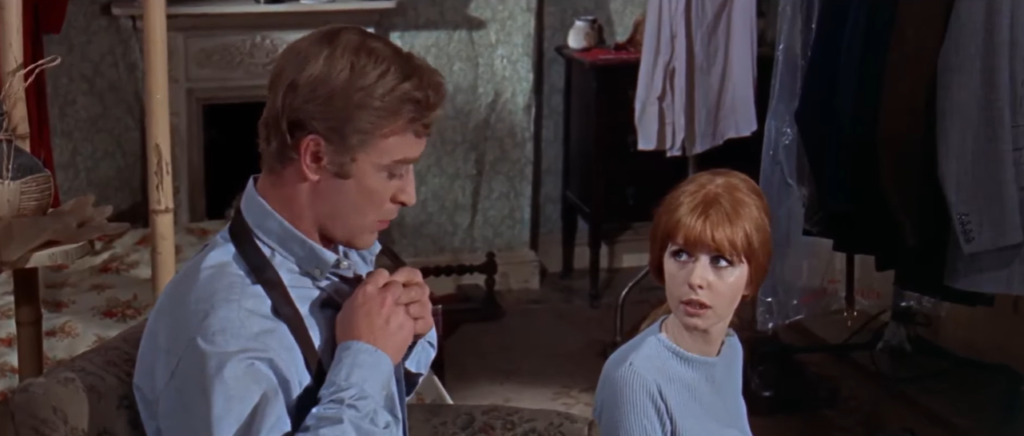
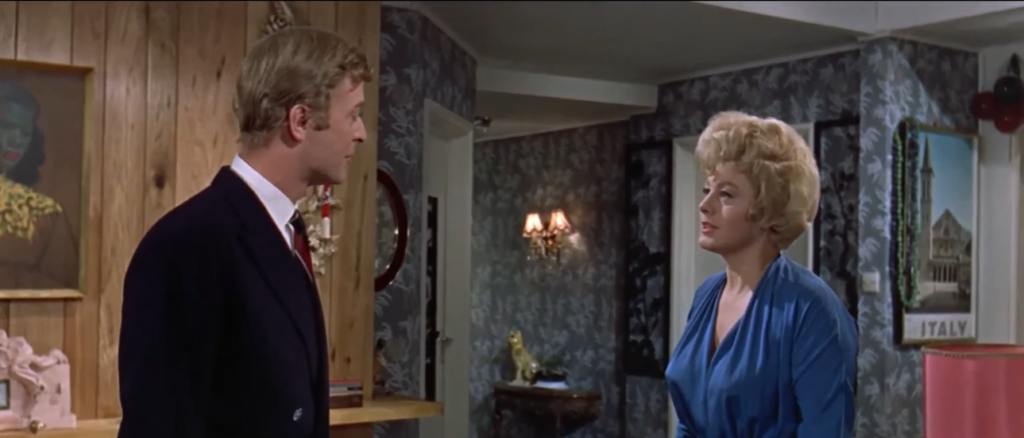
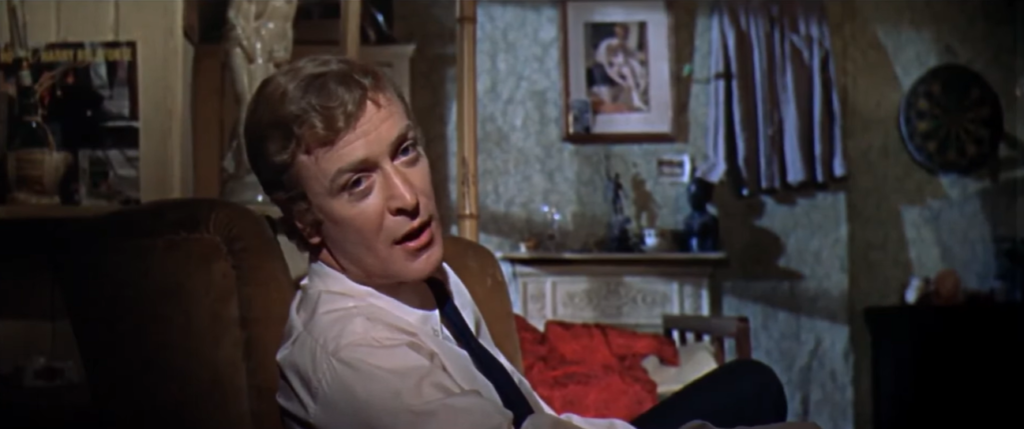
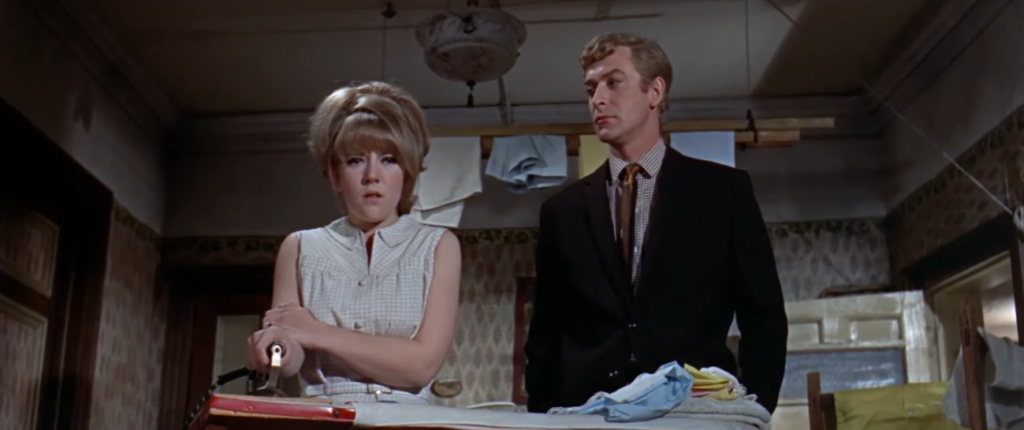

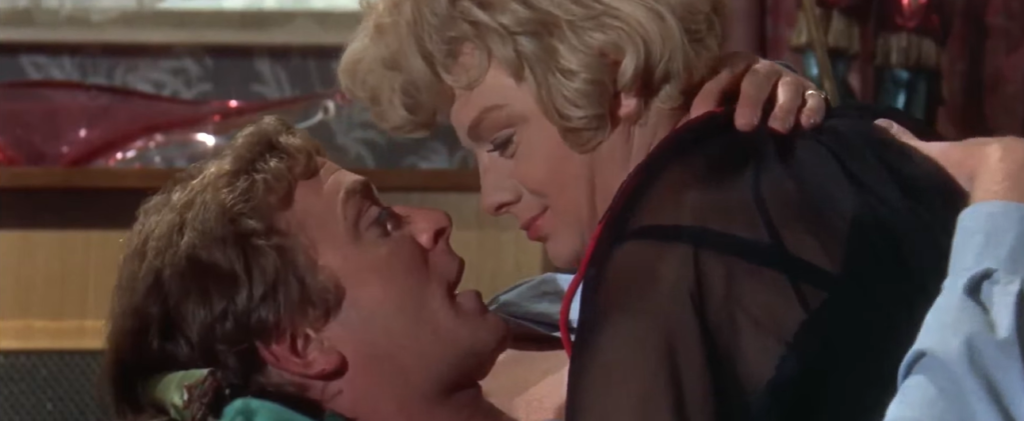
5 thoughts on “Alfie (1966)”
Rewatch (12/20/20). A once-must – as a primary ’60s sexual revolution film.
Before his breakthrough role with ‘Alfie’ (on the heels of ‘Zulu’ and ‘The Ipcress File’), Caine had already been in the film business for 10 years (if you don’t include an uncredited tv film appearance in 1946 at age 13). But, with ‘Alfie’, Caine emerges as a real star, one with staying power (indeed, he is still making films today). Certainly his Alfie is a heel but, thanks to the strength of Bill Naughton’s script (based on his play), Caine is given the opportunity to reveal a heel’s actual inner workings with clarity and insight.
As we got into the mid-’60s, we saw a real outpouring of films dealing with sexual attitudes. Certainly in the US, there were some – like ‘The Group’, ‘Goodbye, Columbus’, etc. – which took a more serious approach but, by and large, the bulk of these films in the US and the UK were more along frivolous lines.
As I mentioned in my response to ‘Darling’, frivolity can make a film with an unlikable protagonist not must-see. Compared to ‘Alfie’, ‘Darling’ is very superficial. There’s a lot of presentational ‘comment’ but no real insight into Julie Christie’s character. So what’s there to care about?, or even think about deeply and with benefit?
Conversely, Naughton’s script takes a real scalpel to the territory; not only in breaking down Caine’s character microscopically but revealing, for example, that Alfie has mirror images in certain women who are also looking for peripheral sexual fulfillment (i.e., Martin’s character). But the script goes even deeper. To offset Alfie’s vulgarity, we’re shown people who know how to handle their emotions and their conscience properly (i.e., Graham Stark as Foster’s eventual husband Humphrey).
Ultimately, ‘Alfie’ has real, significant punch as a critique, esp. as it turns darker in the latter part of the film. The potent abortion sequence is particularly eerie.
Being a more reserved culture, the UK generally seemed to adopt a more sober approach in this period – hence, films like ‘Alfie’, in which there is non-stop talk of sex and yet no actual sex. It looks at casual sex from various angles, concluding that (overall) a steady, pinball diet of it is an empty experience. (It’s sort of disgusting the way Alfie will refer to a woman as “it” instead of “she”; in the way that certain married men refer to their spouse as “the wife” instead of “my wife”: it’s all a form of distancing).
Caine’s performance is perfection (very committed to the precision of Alfie as an a**hole; at times, Alfie sounds as icky as a Republican: “What you don’t realize is that men are more sensitive than women.”) but director Gilbert (also doing a fine job) surrounded him with a solid cast of actors who, together, form a terrific ensemble – with no one actually stealing focus (though Merchant obviously has the showy role in terms of dramatic potential).
The UK may be more reserved in some ways, but we’re far less fundamentalist and prudish than the USA. Something to be considered when viewing all these sexual revolution films and plays of that era.
All points well taken in these comments, and I can understand why this would be considered must-see by many. It’s well-written, well-acted, and well-shot — and the clever storyline does balance out Alfie’s self-serving approach to life with plenty of other possibilities for how to live, have sex, and find happiness. Indeed…
SPOILER ALERT
… many of the women Alfie has an affair with end up just fine: we see Martin at the end, and she’s basically forgotten about him (despite being stood up); Foster is now married to a lovely chap who adopted her child without hesitation, and is busy baptizing her new little girl; Winters is clearly doing just fine with her new (younger) guy; Asher was a mess already from the get-go and at least shows gumption in terms of leaving when she knows inviolable boundaries have been breached; Shirley Anne Field (who I didn’t get around to including in my discussion) simply had a fun little fling on the job as a nurse; and Eleanor Bron (who I also neglected to cover) doesn’t seem to give in to his charms while serving as his doctor — though we also don’t see him trying to work them, given his single-minded focus on rationalizing away his health issues. Merchant is a mess and has been most impacted by Alfie, so it’s hard to forgive him for that.
However, still and all, I’m at a point where I personally refuse to promote (i.e., recommend) cinematic depictions of men who view women as objectifiable prey. I just can’t do it.
I see what you mean. But I don’t think the film itself views women as prey. It doesn’t even have any sex in it. More to the point, I think the film ultimately condemns Alfie as a type. Part of the power of cinema is its ability to illuminate, to teach. So why steer people away from a film that handles its difficult, troublesome subject matter in a mature manner, and does it well?
Besides… what about every James Bond film? They all objectify women. Or doesn’t that matter because they’re spy thrillers?
Yes, good point. But in those films it’s a detail of the character, not the primary point. Bond manipulates and objectifies women as part of his overall approach to “winning” and saving the world (and it’s purely escapist fare). For Alfie, what it’s all about is – Alfie. And he’s all too real as a “type”.
Ironically, I don’t think of sex as necessarily central to the film; to me, it’s about Alfie’s manipulation of women (and men — of everyone, basically) to get all of his needs met. Sex is part of that, but so is house cleaning, cooking, ego stroking, “fiddling” at his job, and maintaining a sense that he’s in control and desirable at all times. Of course, he’s not – so I guess you could say that’s instructive.
But men like Alfie don’t change. He’ll go right along finding other women (and employers, etc.) to use and toss aside. Bah humbug on Alfie and his ilk. Stay clear.